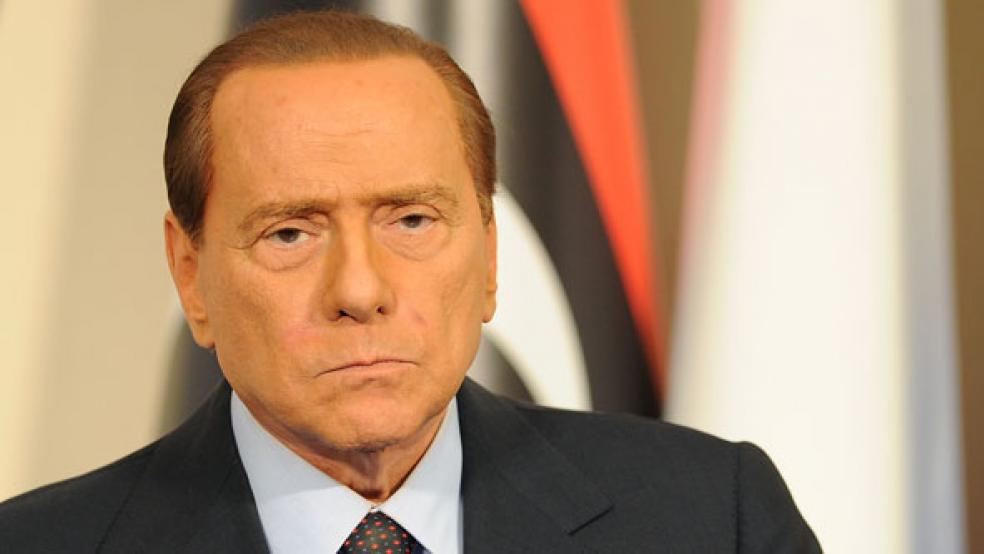Silvio Berlusconi, who spent nearly two decades atop the world of Italian politics, resigned Saturday night after lawmakers rushed through a budget bill seen as the first step toward winning back investor confidence and preventing the collapse of the world’s eighth-largest economy.
The resignation ends a political era punctuated by headlines of Berlusconi’s “bunga bunga” sex parties and a litany of colorful gaffes. Ultimately forced out of office by a debt crisis instead of personal scandal, the flamboyant billionaire’s departure appeared to be paving the way for a staid, serious economist, Mario Monti, to attempt to form an interim government here and try to pull Italy back from the brink.
As a last act of the Berlusconi government – and one he had demanded before resigning – a confrontational lower house gave final approval Saturday to a budget bill passed by the Senate on Friday, and which contains measures insisted on by the European Union. But the bill is seen as only a precursor to a far more controversial and sweeping economic reform package that observers hope Monti can push through in the coming weeks. Its passage will be vital, economists say, to kick-starting Italy’s moribund economy and quelling investor fears over this nation’s ability to service its $2.6 trillion debt.
After the vote, Berlusconi rode to Rome’s grand Quirinal Palace, a former home of popes, to tender his resignation to Italy’s ceremonial head of state, President Giorgio Napolitano. Berlusconi now tops a list of European leaders, including those in Greece, Ireland and Portugal, who have unceremoniously lost their jobs in turmoil from the region’s two-year-old debt crisis. Crowds of supporters and protestors filled the streets outside the palace; one band of the latter played choruses of “Hallelujah” to herald Berlusconi’s departure.
Italian politicians were coming under intense international pressure – including from President Obama and French President Nicolas Sarkozy– to rally around a credible figure to lead a new unity government.
On Saturday, Italy’s notoriously divided political classes were in fierce negotiations over fresh leadership, with some still calling for snap elections that could leave Italy stuck in a power vacuum for months. But Monti, the 68-year-old professor and former European Commissioner, still appeared to be the top candidate to head an emergency government that could last for as long as a year.
For Berlusconi, a 75-year-old media mogul-turned-celebrity politician who challenged Catholic mores, the extraordinary events of recent days underscored the power of economics in politics. Though he came to power in the 1990s promising a free market revolution that would make Italy a dynamo in Europe, he is criticized as having failed to fulfill that promise and as fostering a culture of tax evasion and cronyism that contributed to the loss of market confidence in recent weeks.
“I and others have always argued that Berlusconi’s scandals were not important to the electorate,” said Renato Mannheimer, chief of ISPO, one of Italy’s most prominent polling firms. “Had he succeed in delivering the economic reforms and the growth he once promised, Italians would not have cared what he did in his private life. But he failed.”
Berlusconi’s supporters insisted that although the long-time prime minister was down, he might not be out. Berlusconi is pushing his anointed successor, Angelino Alfano, 41, to be Italy’s next elected leader, and few observers rule out another run by Berlusconi at some point.
“On a human level, this is a very difficult moment,” Nunzia De Gerolamo, a lawmaker with Berlusconi’s People of Liberty Party, told Sky news. “Berlusconi represented for me and for many young people the hope of an Italy that could have been. With all due respect for Mario Monti, Berlusconi isn't finished. The others shouldn’t be chanting victory."
The budget bill that passed Saturday represents initial steps toward addressing Italy’s bloated state and lack of competitiveness. It would, for instance, raise the general retirement age from 65 to 67 by 2026, deregulate professions including architecture and engineering and offer tax breaks to companies that hire young apprentice workers.
But Emma Marcegaglia, head the powerful industrial group Confindustria, called the just-approved package “not significant” compared with to the larger reforms Italy is now under pressure to produce in relatively short order. For instance, although the bill passed this weekend raises the retirement age, it does not tackle the larger problem that Italian workers are still allowed to retire after 40 years of service, meaning that some can start collecting pensions as early as their 50s. It also fails to address labor laws that make it tough for large companies to fire workers.
Those broader measures – likely to be far more hard-fought – are expected to be considered in the coming weeks.
“The markets are waiting for Monti to push through the significant reforms,” Marcegaglia said. “And it has to happen fast.”
Special correspondent Sarah Delaney contributed to this report.

